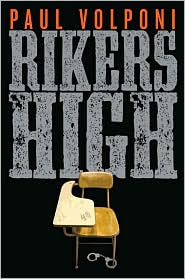Continuing his tradition of writing well-crafted, thought-provoking,  gripping novels for teens that blend fiction with tough reality, Paul Volponi’s latest, Rikers High, is another knock out. With a deceptively simple plot, following Forty’s last 2 weeks in juvenile detention on NY’s Rikers Island, the book is full of wry observations, authentic characters, street slang, and sensitivity.
gripping novels for teens that blend fiction with tough reality, Paul Volponi’s latest, Rikers High, is another knock out. With a deceptively simple plot, following Forty’s last 2 weeks in juvenile detention on NY’s Rikers Island, the book is full of wry observations, authentic characters, street slang, and sensitivity.
17 year old Martin Stokes (inmate in bed #40 in the mod, so he takes the name Forty) has been on Riker’s Island for 5 months awaiting trial on a trumped up steering charge. Frustrated with his court appointed lawyer and the numerous delays in the judicial system, Forty is bound for court on June 2 when the story opens, secretly hopeful he’ll be released that day. Unfortunately, his trial is delayed again and he’s returned, angry and frustrated, back to Riker’s. When they reach the yard, the guy he’s shackled to is jumped and Forty’s face is razored, leaving him an ugly scar that is both a physical and metaphoric reminder of what his time on Riker’s has done to him.
After the incident in the yard, Forty is transferred to a new module where the teen inmates attend school, and he meets a teacher who respects the teens enough to treat them like human beings. The 2 weeks we spend with Forty in Sprung #3 and in Riker’s high school allow us to see the daily humiliations, power struggles, and painful injustices that life in juvenile detention hold. Few adults treat the kids as more than animals, the system seems set up to make repeat offenders out of every one of them, and the temptations to violence, revenge, and corruption are rampant. But we also see Forty and the other inmates struggle with fear, grief, and a sense of loss that elicits sympathy that contrasts poignantly with the gritty, unforgiving world they inhabit.
Rikers High,and Martin in particular, are strongly reminiscent of Steve Harmon in Walter Dean Myers’ Monster. Both novels have well crafted, high-interest plots, very readable narratives, authentic characters, and repeatedly challenge readers with difficult questions to which there are no easy answers.
- Posted by Cori
